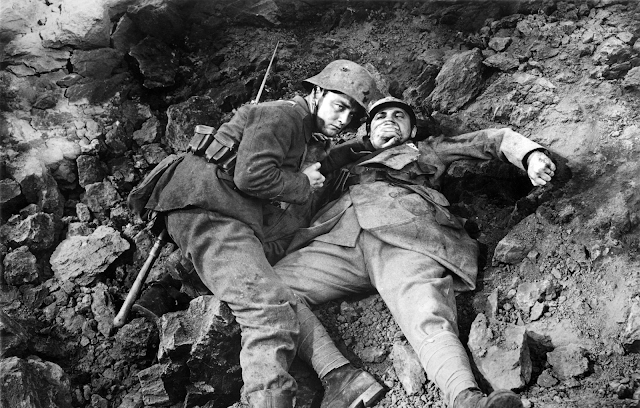All Quiet on the Western Front (1930)
Lewis Milestone's "All Quiet on the Western Front"
"All Quiet on the Western Front" was a very important film for Hollywood in 1930. At the time, sound pictures had become a new, primary focus. However, the difficulty in getting sound pictures made proved difficult. This was especially true after the financial collapse of 1929. So, the $1.25 million the film was produced for was one of the biggest gambles Hollywood had ever taken. The gamble, however, paid off. "All Quiet on the Western Front" was one of the biggest films Hollywood ever produced. It caused an even bigger fervor on the other side of the Atlantic. The film was so hated by Germany, and Nazis in particular, that many of the projections of the film were disrupted. Stink bombs were set off in the theaters as well as mice. The film was so controversial in Germany that it was eventually banned when the Nazis seized power only a couple of years later. Aside from this, "All Quiet on the Western Front" was a smash hit all over the globe.
While watching the film, I was very impressed by the frenetic-ness of the action scenes and the relative ease with which dialogue and sound was incorporated, considering the difficulties of the time. As far as technicality goes, "All Quiet on the Western Front" should be lauded, as it certainly is. However, overall, the film seemed much hollower to me than World War I films around the same time period. Despite being a silent picture, "The Big Parade" was able to pull off the same intentions as "All Quiet on the Western Front," only with more emotionality. Similarly, Germany's own "Westfront 1918" incorporated sound to really bring its audiences right into the trenches and battlefields of World War I. However, "Westfront 1918" comes across as a starker and grittier piece. "All Quiet on the Western Front," on its surface, seems to check all the boxes of a war picture. Perhaps that is its problem, that it is TRYING to check all of the boxes. Because of this, the film seems to lack soul. Perhaps in 1930 it did not. However, when watching the film, I am reminded of every other war film over the last century. Because of that, however, maybe "All Quiet on the Western Front" should be lauded as an originator of these certain formulas. However, formula does not make a picture interesting. Rather, films like King Vidor's "The Big Parade" and G.W. Pabst's "Westfront 1918," despite not being as technically smooth as "All Quiet on the Western Front," seem to do a far better job of instilling their films with emotion and weight.




Comments
Post a Comment